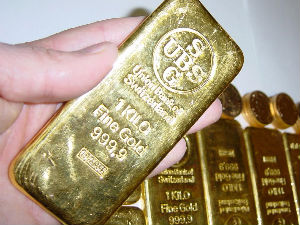Basics about Gold Exchange Traded Fund (Gold ETF)

(To know what are Exchange Traded Funds, click here)
What is Gold ETF?
Gold Exchange Traded Funds also known as paper gold are open-ended mutual fund schemes that collect money from investors and invest the same in standard gold and gold bullion (with purity levels of 99.5%). Gold and gold bullion act as an underlying asset for the scheme and the investors are provided with the units of the fund.
Unlike, regular mutual funds schemes, the units of Gold ETF are listed on an organised stock exchange like BSE and NSE; hence, they can be bought and sold like stocks on a real-time basis. They are passively managed fund and closely track the performance and yield of gold in spot market and provide returns accordingly.
Presently there are many Gold ETFs traded in India. Some of the listed Gold ETFs are Gold Benchmark ETF - GoldBees, UTI Gold ETF – GoldShare, Kotak Gold ETF – KotakGold, Reliance Gold ETF – RelGold, etc.
Why to invest in Gold through ETF?
Gold ETFs definitely score over physical gold as they eliminate the hassles and drawbacks of physical gold. Some of the advantages are as follows:
- Convenient and Price-effective: The electronic form of buying, selling and storing gold is more convenient and price-effective than buying it in physical form. For example, if an investor keeps gold in a bank locker, he has to spend money on storage.
- Quality: As per SEBI regulations, the purity of underlying gold in Gold ETFs should be 99.5% fineness and above. This spares investors the trouble of finding a reliable source to buy gold.
- No premium: Jewellers and banks generally sell gold at a premium. The premium can be in the range of 5%-10% (inclusive of making charges) in case of jewellers and upto 15% in case of banks. Since Gold ETFs are traded on the stock exchange, they can be bought at the prevailing market rate without paying any premium.
- Resale value: Gold ETFs can be easily sold in the secondary market on a real-time basis at the prevailing market price. Whereas, while selling physical gold, the jeweller will deduct making charges. And, if you have bought from banks, they usually refuse to buy back gold.
Gold ETFs allow investment in gold in small denominations, which makes it easier for the retail investor to participate because the minimum lot is one unit on the secondary market. This enables the investor to accumulate units over time and thus build wealth.
(Also read: Five different ways to invest in Gold)
OneIndia Money
































